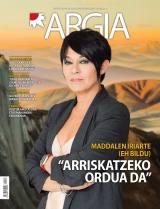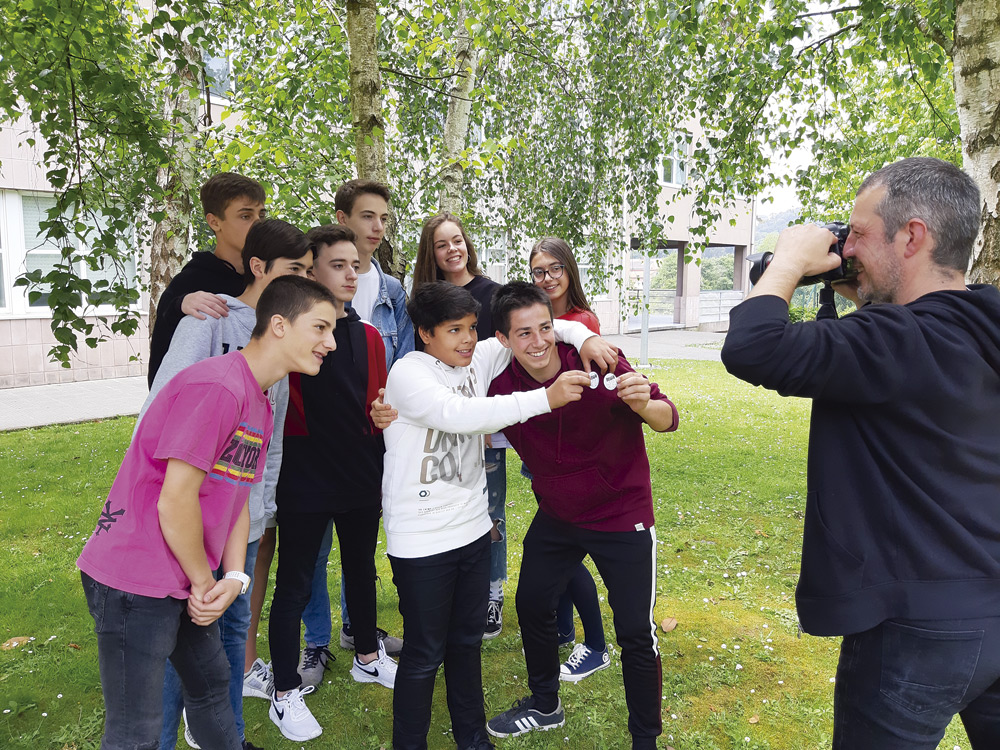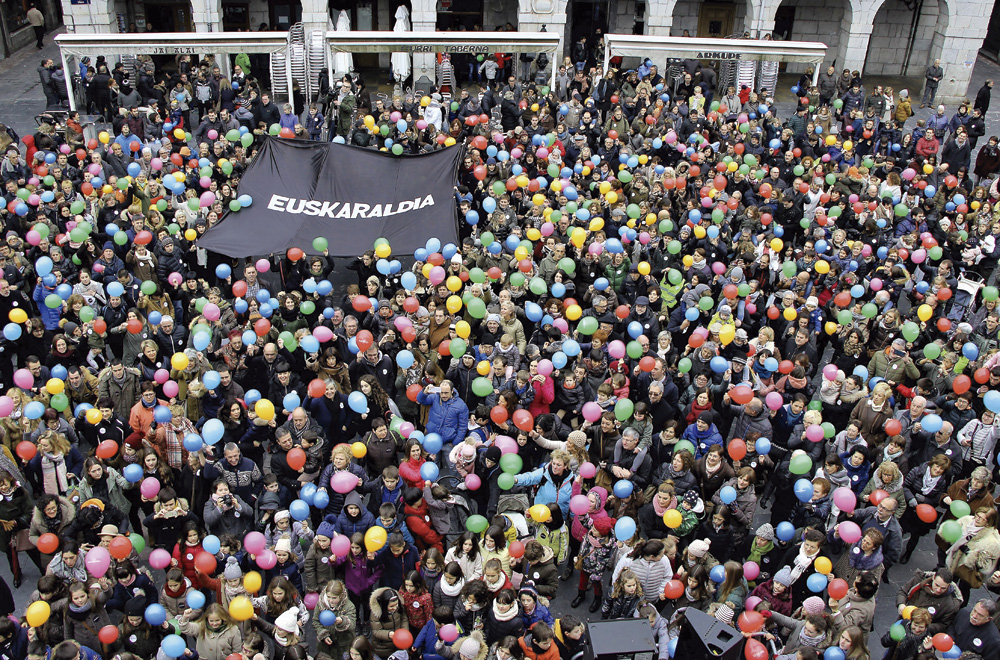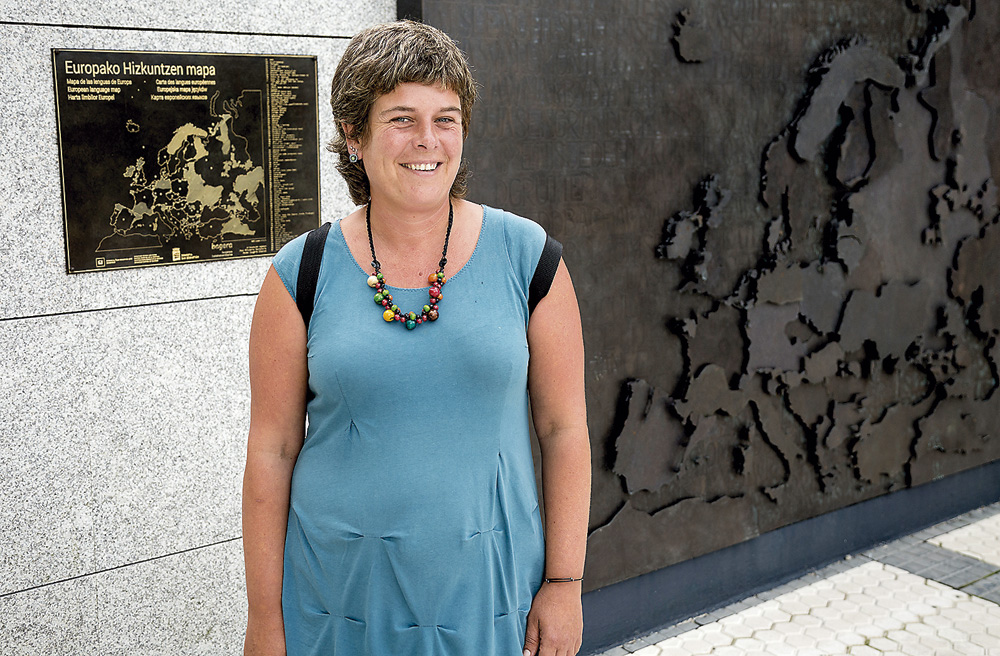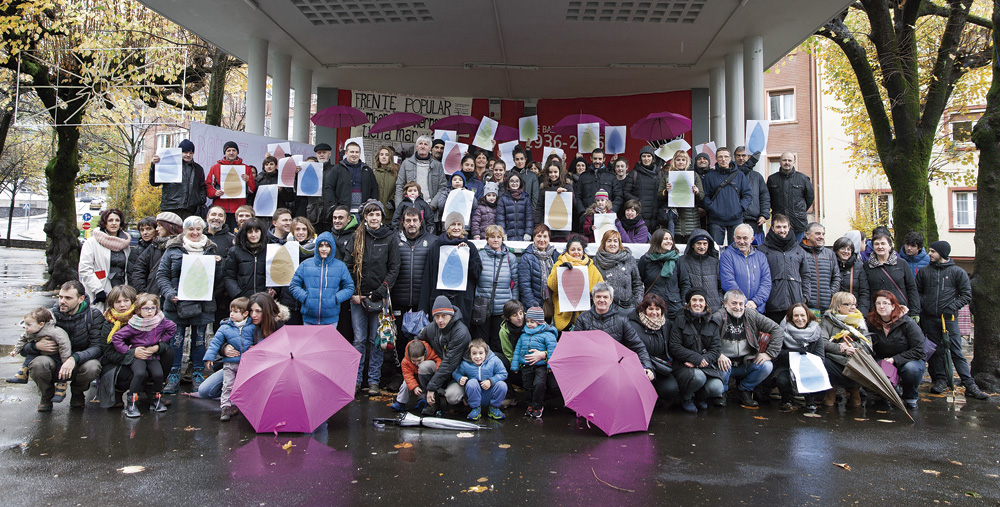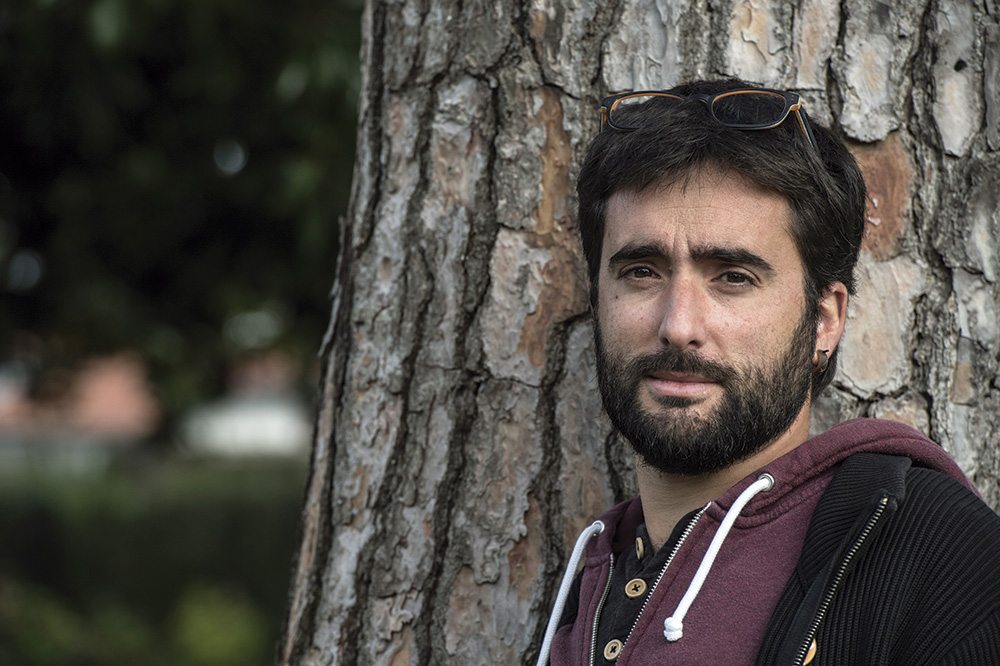"If we want another coexistence, we must give a role to the Castilian speakers"
- Agurain’s neighbours already had 15 hours of holiday in Euskera, but this year they wanted to do more. They have not held a party, from 8 to 11 November, with a day of work, in the day to day, they have tried to speak in Basque. They have activated the Vasco-speakers, they have given explanations to the Castellanospeakers to adapt to the new situation, and the Basque culture of the half-slept people has been unleashed. We interviewed Asier Lafuente, member of the 75-hour initiative in Basque.
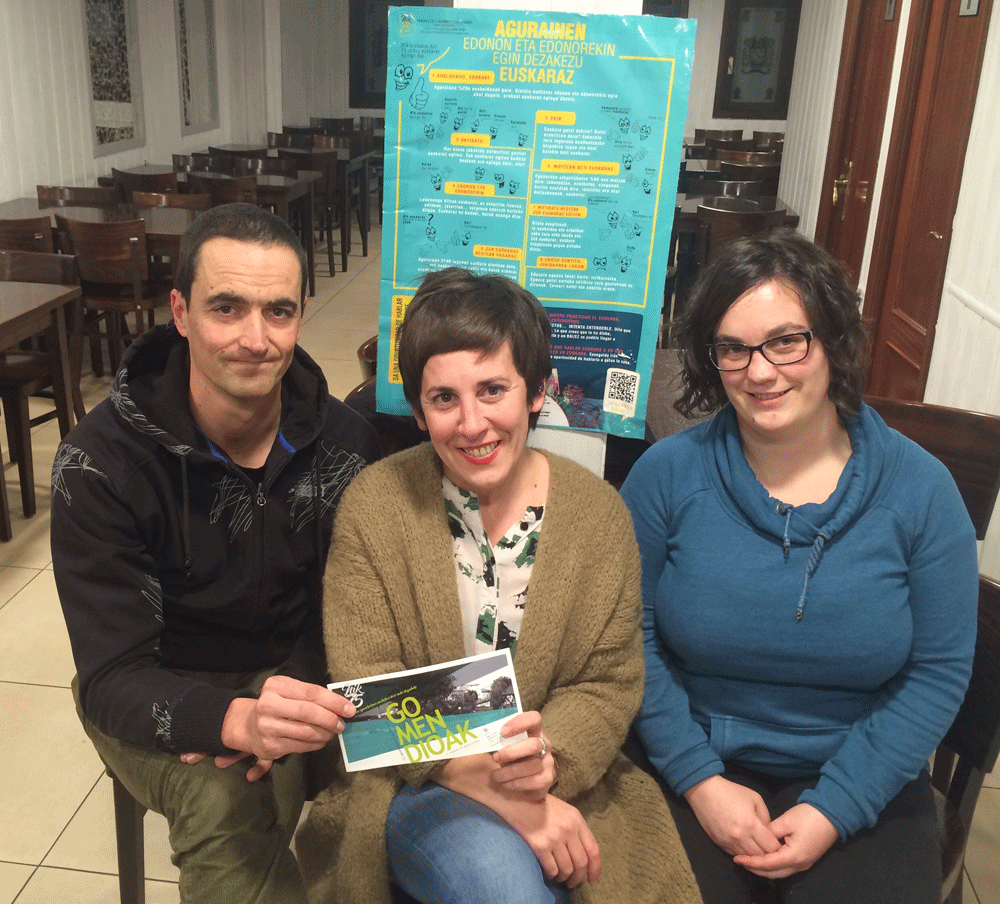
Why did you do the project 75 hours in Basque?
To break an inertia. We met on February 23, because every two years a claim is made in Basque, 15 hours in Agurain. It's a party in traditional format, program all day long, street food, etc. When we got together in February, we said we needed something else in the village, something that would leave a conclusion.
In 2015 we mentioned the performance performed by Lutxo Egia and the one being carried out in the Donostiarra neighborhood of Egia. That is what we proposed at that meeting and we brought a more concrete proposal to the next meeting. We doubted, how many could we be with that linguistic behavior in Salvatierra for several days? In the meeting we were twenty people and we started to calculate: if each one gets five we can be a hundred. We set ourselves in motion with total conviction, but with many doubts.
What was the goal?
To make the Basque necessary, and to do so we had to empower and activate the Euskaldunes, change the linguistic habits. But customs don't change from one moment to another, so we put a six-month deadline to do so in November. Four days, from Tuesday to Friday, not public holidays, the area we wanted to get was everyday.
Although the objective was not a Castilian paradox, Salvatierra is a Castilian village and we saw it necessary to prepare the people, to obtain situations to adapt to the Castilian paradox. We wanted to achieve this social consensus through collectives, establishments and institutions.
We did two campaigns, one, I got 75 and 283 engagements. For four days they have spoken in Basque anywhere and with anyone. The other campaign was Guk 75. We make visits to institutions, establishments and groups and ask for commitments. To merchants and bars, for example, we asked for the conversations to be bilingual, we asked those who spoke in Basque to try to understand them, not to tell them to go to Spanish. To be in favor of the Basque is to give the other the opportunity to speak in Basque.
It says it's an abrasive message.
We are convinced that if we want a different coexistence in the Basque Country we have to give a role to the Castilian speakers and it is not enough to be in favour of the Basque country. It’s no good saying, “I don’t know Basque and I ask you to do it in Spanish.”
The reality is that the collectives, the establishments… have welcomed very well and we have achieved a social consensus. These coarse words are used by the Basque Government itself, but in what concrete form? We believe that this is what we need to do, in the attitudes of the Castilian speaking people, if we go to Euskera so that they do not ask us to take the step to Spanish.
A survey was conducted among the participants. What did you answer?
To locate we will say that Agurain has 5,000 inhabitants, 3,600 over 17 years of age. Euskaldunes over 17 years 800. In the campaign there have been 283 active Euskaldunes. Therefore, we have about 500 passive Euskaldunes in the village. Of the 283 signatories to the survey, 201 responded to it. The first question was whether they have made more effort than usual to use the Basque language. 86% of respondents say yes to the proposal. Then we asked them whether the activation of other Euskaldunes was detected in the village and 65% said yes. Another question was where the new relations in Euskera have won. They have responded to this: 51% of shops, bars or entities; 34% of acquaintances; 22% of crew members; 17% of housewives; 17% of strangers; 9% of peers; and 19% have not gained contact.
The percentage of new relationships with traders and entities stands out. We have worked in this field in particular. What we've learned is that if you work in an area, you create new relationships.
In the next question, we asked them how they worked. We have proposed to you for six months new behaviors and we would like to know what they have used. In view of the answers we have realized that there are two levels of activation. The behavior of “First Word in Basque” has been 80%, but in all other behaviors we are around 20%. For example, “with whom I have all spoken Basque” 20%; “if they answered me in Spanish I was still in Basque” 26%; “although I have not tried to express it in Basque through gestures” 20%; “we have agreed to do it in Basque” 24%.
The answer to the last question was very satisfactory to us. We asked them if they were willing to continue their new behaviors. 87% say yes. For us, it was one of the goals of these four days, to empower people so that they can deploy new behaviors and give them continuity.
You have put together a heterogeneous group to organize the project.
On February 23, representatives of the collectives met to organize a party. But as a new project was proposed at that meeting, we all started together. In Salvatierra/Agurain there is the association of the Basque Country Olbea, and although in 75 hours some of them have participated, we have not functioned as an association of the Basque Country Olbea. The initiative has served to activate the cultural activity in Basque in the municipality. We weren't very active.
If we have to take a second step, we have to decide how we are going to work; like Olbea, with the commitment of the militancy that that implies, or if we find a formula that is more related to civility. People don't want to join a lifelong project. We were surprised by the number of people who had approached us to propose such a thing. Looking to the future can also be a proper formula: the project has a start and an end, people can change.
They not only call the Basques, they also call the public institutions.
We are aware that with what we have done we have placed all the responsibility on the Basques, on the active Basques. We've asked them to be abrasive, to be motor, to create need. We believe that we must now require the institutions to maintain this new situation that has been created, that new coexistence. They must put the human and economic resources in place. We have started to meet with the political parties, the PNV and EH Bildu. We want to convey our appreciation to them, ask them for more resources and make policies bolder. Organizations must be wet.
The City Council and the Council, too, must begin to do social pedagogy. We have done so, we have given continuous recommendations to activate the vasco-speakers and to be able to adapt to the Castellanoparlanantes. At the moment the institutions do not, they do a lot of pedagogy in other areas, in ecology, in gender, in consumption, in traffic, but not in linguistic customs. There, too, they have to start.
Euskaraldia, EAEko instituzio nagusi guztietan PSErekin gobernatzen duen PNVk Topagunearekin izenpeturiko akordio estrategikoa da, ez nik hala esaten dudako, beraiek publikoki 2017ko Udaltopean horrela aurkeztu eta definitu zutelako baizik. Eta Euskaraldia da PNVk, bere... [+]
Guk dakigula ez dute halakorik egin, baina Alberto Irazu kazetariak euskaraz egin du elkarrizketa zuzenean Radio Euskadin, ia 20 minutuko esperimentua.
Hernaniarrek errodajea dute, eta 2018ari begira pentsatu dute ez direla udazkeneko hotzen zain egongo. Urte osoan saiatuko dira 24 orduz euskaraz egiten. Euskara Ari Du elkartea sortu berri dute horretarako.
Aurten gehiegi pentsatu beharrik ez dago, zer egingo dugu bertso saioa, ginkana, txokolate jana, mosaikoa, lipduba? Horiek ere egingo dira, baina herri dezentetako herritarrek eta euskalgintzak motorrak berotuta dituzte. Kalera aterako dira egun osoz euskaraz egiteko asmoz.
Sustatzaile nagusi Euskaltzaleen Topagunea eta Eusko Jaurlaritza ditu. Xedea 2018ko udazkenean Euskal Herriko txoko guztietan herritarren hizkuntza ohiturak aldatzeko praktikak egitea da.
Establezimenduen zerrenda egin dute euskaraz aritzeko duten gaitasunaren arabera. Udazkenean, beste herri askotan bezala, derioztarrak “ahobizi” eta “belarriprest” bilakatuko dira.
Errenteria, Oiartzun, Pasaia eta Lezon 110 lagunek konpromisoak hartu dituzte euskara erabiltzeko.
Baiona, Angelu eta Miarritze artean egingo dute ekimena, azaroaren 27tik abenduaren 3ra bitartean. 450 hiztun mobilizatu nahi ditu BAM ekimenak. Antolatzaileek euskaraz “naturaltasunez eta alaitasunez” aritzeko deia egin dute.
Ekimen berria du Aiaraldeko Euskalgintza Kontseiluak esku artean: 1.000 ahobizi eta 5.000 belarriprest “armairutik" ateratzea. Euskaraz hitz egiten dakitenen eta hizkuntza ulertzen dutenen arteko zubiak eraikitzea da egitasmoaren xedea. Astebeteko lau txanda egingo... [+]









